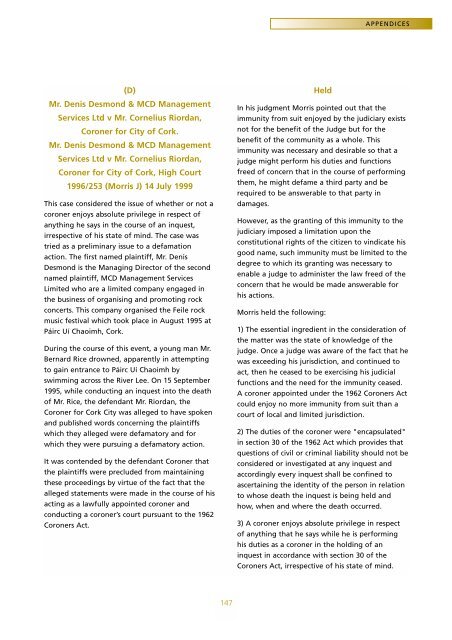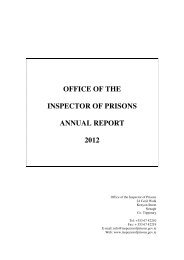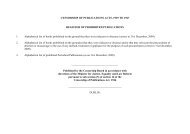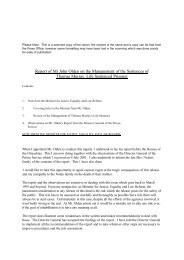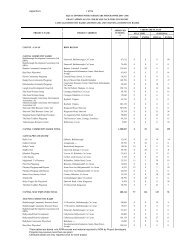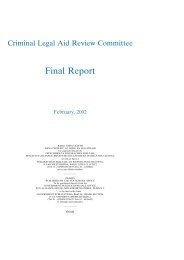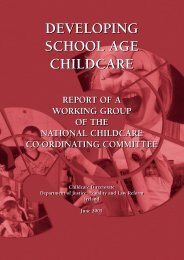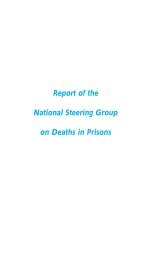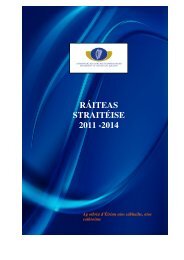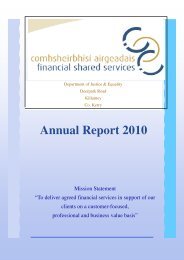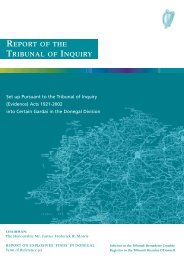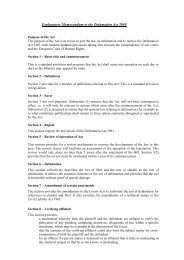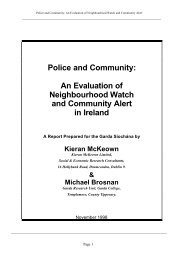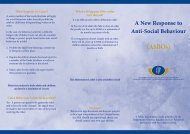Review of the Coroner Service - The Department of Justice and ...
Review of the Coroner Service - The Department of Justice and ...
Review of the Coroner Service - The Department of Justice and ...
Create successful ePaper yourself
Turn your PDF publications into a flip-book with our unique Google optimized e-Paper software.
APPENDICES(D)Mr. Denis Desmond & MCD Management<strong>Service</strong>s Ltd v Mr. Cornelius Riordan,<strong>Coroner</strong> for City <strong>of</strong> Cork.Mr. Denis Desmond & MCD Management<strong>Service</strong>s Ltd v Mr. Cornelius Riordan,<strong>Coroner</strong> for City <strong>of</strong> Cork, High Court1996/253 (Morris J) 14 July 1999This case considered <strong>the</strong> issue <strong>of</strong> whe<strong>the</strong>r or not acoroner enjoys absolute privilege in respect <strong>of</strong>anything he says in <strong>the</strong> course <strong>of</strong> an inquest,irrespective <strong>of</strong> his state <strong>of</strong> mind. <strong>The</strong> case wastried as a preliminary issue to a defamationaction. <strong>The</strong> first named plaintiff, Mr. DenisDesmond is <strong>the</strong> Managing Director <strong>of</strong> <strong>the</strong> secondnamed plaintiff, MCD Management <strong>Service</strong>sLimited who are a limited company engaged in<strong>the</strong> business <strong>of</strong> organising <strong>and</strong> promoting rockconcerts. This company organised <strong>the</strong> Feile rockmusic festival which took place in August 1995 atPáirc Uí Chaoimh, Cork.During <strong>the</strong> course <strong>of</strong> this event, a young man Mr.Bernard Rice drowned, apparently in attemptingto gain entrance to Páirc Uí Chaoimh byswimming across <strong>the</strong> River Lee. On 15 September1995, while conducting an inquest into <strong>the</strong> death<strong>of</strong> Mr. Rice, <strong>the</strong> defendant Mr. Riordan, <strong>the</strong><strong>Coroner</strong> for Cork City was alleged to have spoken<strong>and</strong> published words concerning <strong>the</strong> plaintiffswhich <strong>the</strong>y alleged were defamatory <strong>and</strong> forwhich <strong>the</strong>y were pursuing a defamatory action.It was contended by <strong>the</strong> defendant <strong>Coroner</strong> that<strong>the</strong> plaintiffs were precluded from maintaining<strong>the</strong>se proceedings by virtue <strong>of</strong> <strong>the</strong> fact that <strong>the</strong>alleged statements were made in <strong>the</strong> course <strong>of</strong> hisacting as a lawfully appointed coroner <strong>and</strong>conducting a coroner’s court pursuant to <strong>the</strong> 1962<strong>Coroner</strong>s Act.HeldIn his judgment Morris pointed out that <strong>the</strong>immunity from suit enjoyed by <strong>the</strong> judiciary existsnot for <strong>the</strong> benefit <strong>of</strong> <strong>the</strong> Judge but for <strong>the</strong>benefit <strong>of</strong> <strong>the</strong> community as a whole. Thisimmunity was necessary <strong>and</strong> desirable so that ajudge might perform his duties <strong>and</strong> functionsfreed <strong>of</strong> concern that in <strong>the</strong> course <strong>of</strong> performing<strong>the</strong>m, he might defame a third party <strong>and</strong> berequired to be answerable to that party indamages.However, as <strong>the</strong> granting <strong>of</strong> this immunity to <strong>the</strong>judiciary imposed a limitation upon <strong>the</strong>constitutional rights <strong>of</strong> <strong>the</strong> citizen to vindicate hisgood name, such immunity must be limited to <strong>the</strong>degree to which its granting was necessary toenable a judge to administer <strong>the</strong> law freed <strong>of</strong> <strong>the</strong>concern that he would be made answerable forhis actions.Morris held <strong>the</strong> following:1) <strong>The</strong> essential ingredient in <strong>the</strong> consideration <strong>of</strong><strong>the</strong> matter was <strong>the</strong> state <strong>of</strong> knowledge <strong>of</strong> <strong>the</strong>judge. Once a judge was aware <strong>of</strong> <strong>the</strong> fact that hewas exceeding his jurisdiction, <strong>and</strong> continued toact, <strong>the</strong>n he ceased to be exercising his judicialfunctions <strong>and</strong> <strong>the</strong> need for <strong>the</strong> immunity ceased.A coroner appointed under <strong>the</strong> 1962 <strong>Coroner</strong>s Actcould enjoy no more immunity from suit than acourt <strong>of</strong> local <strong>and</strong> limited jurisdiction.2) <strong>The</strong> duties <strong>of</strong> <strong>the</strong> coroner were "encapsulated"in section 30 <strong>of</strong> <strong>the</strong> 1962 Act which provides thatquestions <strong>of</strong> civil or criminal liability should not beconsidered or investigated at any inquest <strong>and</strong>accordingly every inquest shall be confined toascertaining <strong>the</strong> identity <strong>of</strong> <strong>the</strong> person in relationto whose death <strong>the</strong> inquest is being held <strong>and</strong>how, when <strong>and</strong> where <strong>the</strong> death occurred.3) A coroner enjoys absolute privilege in respect<strong>of</strong> anything that he says while he is performinghis duties as a coroner in <strong>the</strong> holding <strong>of</strong> aninquest in accordance with section 30 <strong>of</strong> <strong>the</strong><strong>Coroner</strong>s Act, irrespective <strong>of</strong> his state <strong>of</strong> mind.147


